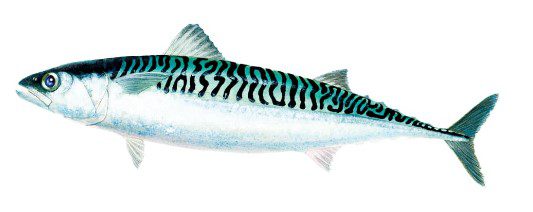

Mackerel is an edible fish that, while safe for dogs in general, can present health risks. It is an excellent source of iron, omega-3 fatty acids, selenium, vitamins B12 and B3, and protein. It is high in fat, however, and can cause health issues in dogs with pancreatitis or dogs that are overweight. The king mackerel and Spanish mackerel contain high levels of mercury, and canned mackerel may include preservatives and added flavoring. Raw mackerel should not be fed to dogs as it may contain harmful parasites and bacteria.
Mackerel is a great way to give dogs additional nutrients. The iron, omega-3 fatty acids, selenium, and vitamins B12 and B3 support brain, nerve, and heart health in dogs. The protein in mackerel is necessary for cell growth and muscle repair. Antioxidants from mackerel help boost immunity against free radical damage.
Mackerel should be avoided by dogs with pancreatitis or that are on a low-fat diet since it is high in fat. Large mackerel varieties like king mackerel and Spanish mackerel contain high levels of mercury and should be avoided. Canned or cooked mackerel has the potential to contain preservatives and added flavoring that can be harmful to a dog’s health. Raw mackerel may result in parasites and bacteria that can cause infection in dogs.
For healthy dogs, mackerel can be served as a treat or as part of a meal. Take caution to only feed small amounts of mackerel at a time. If a dog has pancreatitis or is on a low-fat diet, mackerel should not be a staple in their diet. Always inspect the fish before giving it to your dog and avoid larger varieties such as king mackerel or Spanish mackerel.
Mackerel is an edible fish that is commonly found in the ocean and is also known as Pacific mackerel, chub mackerel, or Atlantic mackerel. Originating from the Atlantic, Indian, and Pacific oceans, it is now popularly consumed worldwide. When given in moderation, mackerel offers an array of benefits to dogs: it is a great source of iron, omega-3 fatty acids, selenium, vitamins B12 and B3, and protein, which all support brain, nerve, and heart health in dogs, as well as cell growth and muscle repair. Antioxidants found in mackerel can also help to strengthen your dog’s immunity. This fish is high in fat, so if your dog has pancreatitis or is overweight, it is best to avoid it. Large mackerel varieties such as king mackerel and Spanish mackerel also contain high levels of mercury and should not be given to your pup. It is best to only feed small amounts of mackerel to healthy dogs as a treat or part of a meal. Raw mackerel can contain parasites and bacteria that can cause infection, so avoid serving it raw.
If mackerel isn't for your pup, trout, sardines, and salmon are also great sources of omega 3 fatty acids with a host of other benefits. Additionally, have you ever fed your pup mackerel and noticed any significant changes in their behaviour or health? How did they enjoy it?
No matter what food you choose to feed your pup, ensure that it is safe and healthy. Provide plenty of love and attention, and your pup will respond with boundless loyalty and affection!